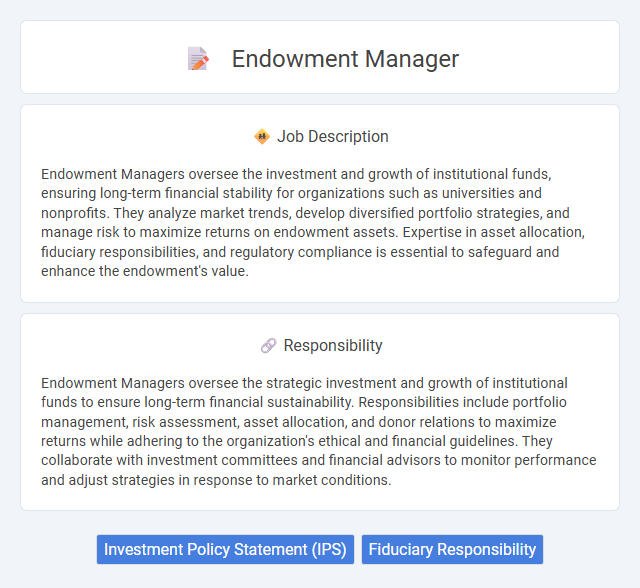
Endowment Managers oversee the investment and growth of institutional funds, ensuring long-term financial stability for organizations such as universities and nonprofits. They analyze market trends, develop diversified portfolio strategies, and manage risk to maximize returns on endowment assets. Expertise in asset allocation, fiduciary responsibilities, and regulatory compliance is essential to safeguard and enhance the endowment's value.
Individuals with strong analytical skills and a keen interest in financial markets are likely to excel as Endowment Managers. Those comfortable with managing large portfolios, making strategic investment decisions, and collaborating with stakeholders may find this role suitable. Candidates who thrive under pressure and possess a long-term vision for asset growth probably have a higher probability of success in this position.
Qualification
An Endowment Manager typically requires a strong background in finance, economics, or business administration, often supported by a CFA designation or a master's degree in finance or related fields. Expertise in portfolio management, asset allocation, and risk assessment is essential to optimize the endowment's returns while preserving capital. Experience with investment strategies, financial modeling, and regulatory compliance enhances the capability to manage large institutional funds effectively.
Responsibility
Endowment Managers oversee the strategic investment and growth of institutional funds to ensure long-term financial sustainability. Responsibilities include portfolio management, risk assessment, asset allocation, and donor relations to maximize returns while adhering to the organization's ethical and financial guidelines. They collaborate with investment committees and financial advisors to monitor performance and adjust strategies in response to market conditions.
Benefit
An Endowment Manager likely enhances the financial stability of an institution by strategically allocating funds to maximize returns while managing risk. This role probably results in improved long-term funding, enabling sustained support for academic programs, scholarships, and campus development. Effective management of endowments may lead to increased financial resources, offering the institution greater flexibility and resilience in fluctuating economic conditions.
Challenge
Managing an endowment fund likely involves navigating complex investment strategies to balance growth with risk mitigation. The challenge may stem from the necessity to optimize returns while ensuring long-term financial sustainability for the institution. Successfully handling market volatility and regulatory changes could be critical components of this role.
Career Advancement
Endowment managers play a critical role in overseeing and optimizing the investment portfolios of institutional funds to ensure sustainable financial growth. Mastery of asset allocation, risk management, and market analysis provides a pathway to senior positions such as Chief Investment Officer or Director of Investments. Continuous professional development, including certifications like CFA or CAIA, significantly enhances career advancement opportunities in this competitive field.
Key Terms
Investment Policy Statement (IPS)
An Endowment Manager is responsible for developing and maintaining the Investment Policy Statement (IPS), which outlines the strategic asset allocation, risk tolerance, and spending rules tailored to the endowment's goals. The IPS serves as a guiding framework ensuring disciplined investment decisions, compliance with fiduciary standards, and alignment with the institution's long-term financial objectives. Regular reviews and updates to the IPS are crucial to adapt to market changes and evolving organizational priorities.
Fiduciary Responsibility
Endowment Managers hold a critical fiduciary responsibility to manage investment portfolios prudently, ensuring the preservation and growth of endowment funds in alignment with donor intent and institutional goals. They must conduct thorough due diligence on asset allocation, risk management, and performance monitoring to safeguard financial resources for long-term sustainability. Compliance with fiduciary standards and regulatory requirements is essential to maintain transparency and accountability in managing endowment assets.
 kuljobs.com
kuljobs.com